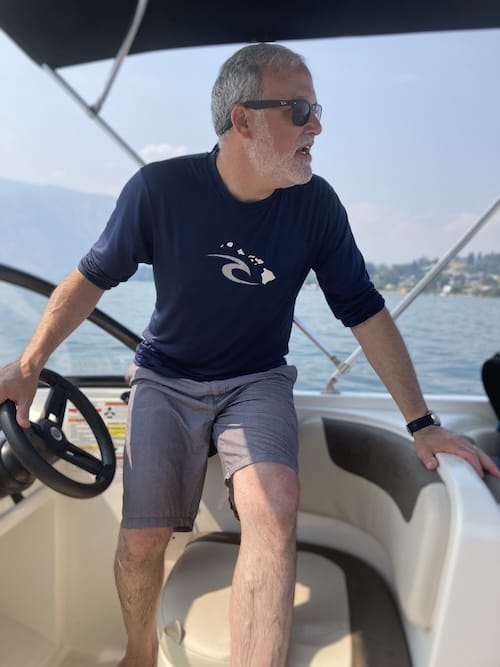Dave Ruzumna has spent more than two decades building his legal practice on a simple but powerful principle: when the truth is on your side, don’t be intimidated by the opposition. The Seattle-based attorney, who founded the Law Office of David Ruzumna, PLLC in 2000, learned this lesson early in his career while defending individuals accused of crimes.
“One case that stands out was a felony theft case. The state had two seasoned prosecutors on the case, with only me and my client on the defense side,” Ruzumna says. “This experience reinforced my belief that when the truth is on your side, the attorney should not be intimidated by the state’s decision to file charges. The truth will win the day.”
After a two-week trial, the jury returned a not-guilty verdict after just two hours of deliberation. This early victory shaped Ruzumna’s approach to legal practice, emphasizing thorough case preparation, careful attention to client concerns, and the power of straightforward storytelling in the courtroom. His practice has evolved from those early criminal defense cases to encompass a broader range of legal services, all built on the foundation of meticulous preparation and client-centered advocacy.
Born and raised in the Brentwood area of West Los Angeles, Ruzumna’s path to law began at Humboldt State University, where he majored in sociology. After graduation, he took a year to explore his options before deciding on law school, where he not only discovered his passion for the legal profession but also met his future wife. He proposed after graduating in 1997, before taking the bar exam, marking the beginning of a whirlwind period of professional and personal milestones.
Dave Ruzumna Builds a Foundation Through Early Practice Experience
After passing the bar exam and marrying, Ruzumna worked for approximately one year at a small law firm before deciding to establish his own practice. The transition from employee to solo practitioner in 2000 marked the beginning of what would become more than two decades of independent legal practice.
The early years of practice brought challenging cases that tested both his legal skills and his understanding of client dynamics. One tough case involved representing a client charged with multiple counts of unlawful gun possession, where the stakes couldn’t have been higher. The client faced years in prison if convicted, and the charges stemmed from what Ruzumna believed was an unlawful warrantless search of his client’s home.
“I intended to bring a motion to suppress evidence, which I was very confident would have succeeded, but as always, I could not be certain,” Ruzumna says. Despite his confidence in the legal merits of the suppression motion, his client chose to accept a plea bargain that avoided prison time but required pleading guilty to one gun charge.
The case continues to influence Ruzumna’s practice philosophy today. “To this day, that case haunts me because there were no repercussions for the police on account of their unlawful actions,” he says. However, the experience taught him crucial lessons about client autonomy and the different perspectives attorneys and clients bring to risk assessment.
“I took away two lessons,” he says. “First, in criminal cases as well as civil cases, it is ultimately the client’s decision as to how to proceed. My job is only to ensure that the client can make an informed decision. Any risk-benefit analysis is vastly different from the client’s perspective as opposed to the attorney’s perspective.”
This understanding of the fundamental difference between the attorney’s and client’s perspectives has become central to how Ruzumna approaches new cases and client relationships.
Developing a Client-Centered Case Strategy
Ruzumna’s approach to taking on new clients or legal matters reflects his hard-earned understanding of client needs and case dynamics. His process begins with what might seem obvious but often gets overlooked in legal practice: careful listening.
“Always listen carefully to what the client tells you, which may seem obvious, but you’d be surprised how many attorneys fail at this,” he says. “Be clear on what the client wants as the desired outcome.”
For litigation matters where disputes have already erupted, Dave Ruzumna takes an additional step that sets his practice apart. He works to thoroughly understand the opposing side’s perspective, recognizing that effective advocacy requires comprehensive knowledge of all viewpoints in a dispute.
His client preparation extends beyond legal strategy to practical expectations. “At the outset of any legal battle, make sure the client understands that the wheels of justice do not always turn quickly, and make sure the client has a realistic understanding of what the costs are likely to be,” he says.
This comprehensive approach to client service reflects lessons learned from influential figures in his career, particularly his father-in-law, who served as CFO and later CEO of a significant real estate development company. The executive’s management philosophy left a lasting impression on Ruzumna’s professional approach.
Dave Ruzumna Masters the Art of Legal Storytelling
One of Ruzumna’s key innovations in his practice has been the development of what he calls narrative-based advocacy. This approach emerged from his recognition that judges and juries need to hear relatable stories rather than abstract legal arguments.
This storytelling approach has proven particularly valuable in King County Superior Court, where most legal motions are decided on written pleadings without oral argument. In this environment, effective written communication becomes paramount to successful advocacy. This reality has driven his commitment to excellent legal writing, which he considers essential to any successful legal practice.
His dedication to improving his writing and advocacy skills includes regular study of the highest levels of legal practice. “I routinely listen to oral arguments in the US Supreme Court and the Washington Supreme Court, knowing that the advocates at that level are at the top of their field,” he says.
Another significant influence on his courtroom demeanor came from his appearances before then-Judge Steven Gonzalez, who now serves as the chief justice of the Washington Supreme Court. Gonzalez’s courtroom style made a lasting impression on the young attorney.
“He was always very soft-spoken, and unlike many judges, he spoke very few words while in court,” Ruzumna says. “The result of this is that whenever he did speak, everyone in the courtroom listened intently. Justice Gonzalez taught me to listen more, speak less, and of course be polite and gracious toward everyone, whether friend or foe.”
Maintaining Professional Excellence Through Continuous Learning
Ruzumna’s commitment to professional development extends well beyond the minimum requirements for continuing legal education. His approach to staying current with legal developments combines formal education with independent study and professional networking. His self-directed learning includes regular listening to oral arguments in appellate courts, where he studies the techniques of top-tier advocates.
Reading remains central to his professional development, particularly materials that demonstrate excellent writing. “I enjoy reading anything that is well written,” he says. “Being able to coherently and articulately convey a thought or story is extremely important to any legal practice. The best way to learn effective legal writing is to read any well-written legal document.”
When it comes to recommended reading for legal professionals, Dave Ruzumna points to an unexpected source: the late Justice Antonin Scalia. Despite potential political disagreements, he recognizes Scalia’s exceptional legal writing abilities.
“Love him or hate him, the late Justice Antonin Scalia was an outstanding legal writer,” Ruzumna says. “His opinions, even those you might disagree with, are always very compelling and often humorous to read. His book ‘Making Your Case: The Art of Persuading Judges,’ co-authored by Bryan A. Garner, is a must-read for any lawyer or law student. Anyone who wants to learn about the art of persuasive writing would be well served by reading this book.”
Dave Ruzumna Structures Practice for Long-term Success
After more than two decades of practice, Ruzumna has developed specific strategies for maintaining productivity and professional effectiveness. His approach emphasizes discipline and structure, particularly important for attorneys who work independently or from home offices.
This disciplined approach to daily practice management reflects broader principles that have guided his career success. The Law Office of David Ruzumna, PLLC represents more than just a legal practice; it embodies an approach to law that prioritizes truth-seeking, client advocacy, and professional excellence. Through careful attention to client needs, continuous professional development, and practical communication skills, Ruzumna has created a practice model that other attorneys can study and adapt.
His journey from sociology student to established legal practitioner illustrates how dedication to core principles can build a successful career. Through the Law Office of David Ruzumna, PLLC, clients have access to legal representation that combines thorough preparation, effective advocacy, and deep respect for client needs and decision-making authority.
In an era when legal practice faces numerous challenges and changes, Ruzumna’s approach provides a roadmap for attorneys seeking to build practices founded on solid principles and exceptional client service. As the legal profession continues to evolve, practitioners like Dave Ruzumna provide examples of how traditional advocacy skills remain relevant and effective.
The Editorial Team at Healthcare Business Today is made up of experienced healthcare writers and editors, led by managing editor Daniel Casciato, who has over 25 years of experience in healthcare journalism. Since 1998, our team has delivered trusted, high-quality health and wellness content across numerous platforms.
Disclaimer: The content on this site is for general informational purposes only and is not intended as medical, legal, or financial advice. No content published here should be construed as a substitute for professional advice, diagnosis, or treatment. Always consult with a qualified healthcare or legal professional regarding your specific needs.
See our full disclaimer for more details.








